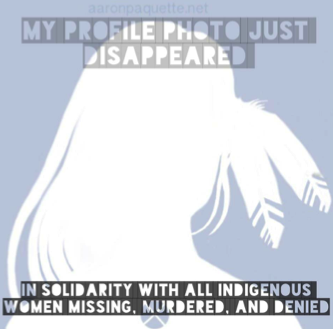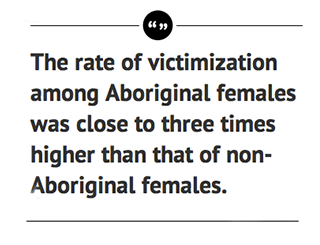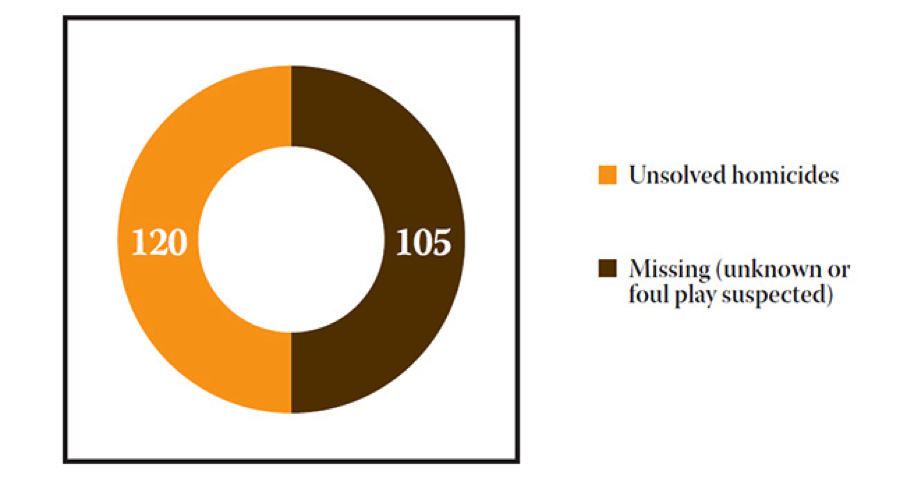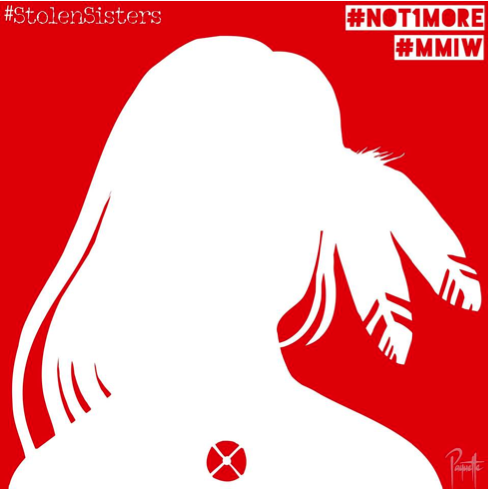It could just be the nature of the people in my social media networks, but every day I see at least 5-10 references about missing and murdered Aboriginal women in Canada. Sometimes many, many more. There are calls for inquiries, petitions to sign and sadly, too often, stories about yet another Aboriginal woman who went missing or has been found dead.
This week I changed my Facebook photo to this image. It was designed by First Nations author and artist Aaron Paquette. On his Facebook page, Aaron says “I designed this image in 2012 to speak to the growing crisis of Missing and Murdered Indigenous women. Thousands of people replaced their profile photos with this image. I am humbled to see it making the rounds again. It is speaking to the forgotten and anonymous nature of the most vulnerable segment in our society.”
As a white woman who recognizes her own privilege and standing I feel that it’s important for me to speak out on these issues. As a researcher on homelessness in Canada, it’s impossible for me to do my work without thinking about Aboriginal homelessness and housing issues. The history of colonization, the reservation system and the impact of residential schools has led to intergenerational trauma, which often correlates with homelessness.
In February, I wrote a blog about Aboriginal Peoples and homelessness that touched on the Feb 14th Strawberry Ceremony and remembrance I attended. The focus of the blog, however, was more on Aboriginal homelessness issues generally and the release of our Aboriginal Homelessness in Canada: A Literature Review by Caryl Patrick.
But in that blog I talked about Loretta Saunders who had gone missing and who was found murdered shortly there after. This week, her cousin, Holly Jarrett started a new petition and social media movement called #AmINext. In this campaign Aboriginal women take pictures of themselves holding a sign saying “Am I Next”. Think about that for a moment. Like many youth black men across North America who have to worry about being a victim of gun violence –whether at the hands of police, random violence or gangs—Aboriginal women face this fear daily.
Earlier this year the RCMP completed their inquiry Missing and Murdered Aboriginal Women: A National Operational Overview. The statistics in this report make it clear that this is not an issue that should be ignored. It doesn’t just affect Aboriginal Peoples but it affects all Canadians.
As the inquiry report states, it’s impossible to talk about this issue without situating it in the broader context of violence against women. That’s an important point to consider as well when talking about homelessness generally because violence, particularly Intimate Partner Violence (IPV) is one of the leading causes for homelessness amongst women. According to the World Health Organization (as cited in the RCMP report) violence “affects one-third of women around the globe and represents a health problem of ‘epidemic proportions’”.
Before looking at the staggering statistics in the RCMP report let’s also remind ourselves that Aboriginal women are a small percentage of the overall population.
- According to recent data from the 2011 National Household Survey, 1.4 million people identified as Aboriginal in 2011, representing 4.3% of the Canadian population.
- The proportion of Aboriginal females in Canada's female population is similar. In 2011, there were 718,500 Aboriginal females in Canada, representing 4.3% of the overall female population that year.
In terms of violence, the RCMP report says that “according to the 2009 General Social Survey (GSS) on Victimization, nearly 67,000 Aboriginal females reported being a victim of violence in the previous 12 months. This means that the rate of victimization among Aboriginal females was close to three times higher than that of non-Aboriginal females.”
The RCMP found 1,181 cases of Aboriginal female homicides and unresolved missing Aboriginal females – 164 missing and 1,017 homicide victims. Of these, there were 225 unsolved cases - 105 missing for more than 30 days as of November 4, 2013, whose cause of disappearance was categorized at the time as "unknown" or "foul play suspected" and 120 unsolved homicides between 1980 and 2012.
In terms of murders, between 1980 and 2012, 32% of Canadian homicide victims were female (6,551 women out of 20, 313 homicides). Yet, despite being only 4.3% of the population, Aboriginal female victims of homicide (1,017) represented 16% of all female homicides in Canada.
In terms of missing women, the 164 missing women can be categorized into 64% suspicious (105 people) and 35% non-suspicious (59 women). Of the non-suspicious deaths, 43 are Aboriginal females presumed to have drown but without enough proof (i.e. no body yet retrieved).
Other woman may be missing or murdered but not identified as Aboriginal. Therefore, these numbers could be even higher.
Paquette says, “Indigenous girls are born into a system where they don't even have a chance. Any Indigenous woman you see who is working to better her life and the lives of her family is a hero of unimaginable strength and willpower…If this were any other demographic group it would be a National Emergency. In Canada, because the women are 'native', we call it Tuesday. We know there is human trafficking on the Great Lakes. We know there are serial killers. We know there are domestic issues, we know about the pig farms...And we know Indigenous women are more often targeted for abuse, kidnapping and murder than any other demographic in the country. If we can turn a blind and disdainful eye to any group of women in our community, where does it stop? Who is next? Something must be done. Stand, speak, share. Hiy hiy”
This post is part of our Friday "Ask the Hub" blog series. Have a homeless-related question you want answered? E-mail us at thehub@edu.yorku.ca and we will provide a research-based answer.





